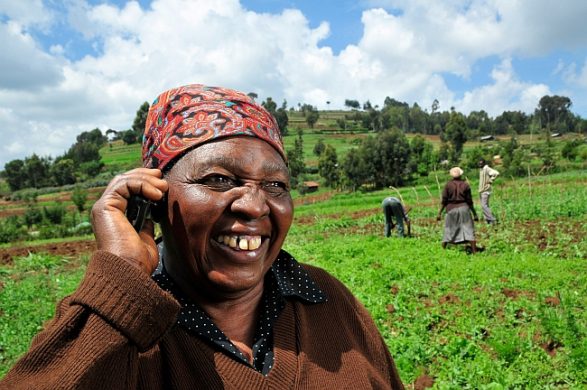Afrikanske landmænd i fjerne områder får nyttige landbrugsråd direkte tikkende ind på deres mobiltelefon, skriver CGIAR, der netop har lanceret mobiltelefon-projekter i Etiopien, Sudan og Egypten.
The information revolution has transformed farming in many parts of the world. Sophisticated computer models can now process huge quantities of data from satellites to local hydrological stations, producing accurate forecasts for even the remotest regions.
This gives wired-up farmers invaluable insights on what crops to plant and when to plant them to maximize agricultural yields.
A Kenyan farmer uses a mobile phone in the field.
Poor farmers in Africa, however, often struggle to get even basic information about water, weather and other factors that might affect their crops.
Recent innovations in computing have enabled extension workers with access to the internet to partly address this information gap.
However, coverage is patchy and the information supplied can be too vague or too late to be of much use.
What if African farmers could get timely, tailored information specifically about their own fields sent directly to their mobile phones in a simple, easy-to-use format?
That is the objective of the Smart ICT-Africa project launched in August 2011.
Successful irrigation development in many African countries remains low.
Currently, only about 5% of agricultural production is supported by irrigation in sub-Saharan Africa. In many areas, rainfall is highly seasonal and, consequently, without water technologies, only one crop a year can be grown.
Skal højne produktiviteten
Furthermore, many farmers live in remote and isolated areas and hence receive little information about new technologies and processes.
Thus, raising farm productivity is a key challenge for the continent. This task is made all the greater by economic water scarcity, rapid urbanization and increasing seasonal variability of rainfall as a result of climate change.
“The project aims to provide farmers with irrigation, agriculture, and weather-related advice and information direct to their mobile phones,” says Bharat Sharma, project leader.
“The tool enables growers to make more informed decisions, and negotiate more efficient and equitable transactions with water- and farming-related service providers.”
Satellit-billeder og individuelle råd
The project is being implemented in Egypt, Ethiopia and Sudan.
Currently, about 60 farmers at each of 4 sites have been trained to use mobile phones that can provide instant access to real-time agricultural and climatic data.
This will be customized to each individual farmer, allowing them to plan at the individual field scale not just what to plant but when the weather conditions will be just right for achieving maximum success.
Satellite images, which can depict areas as small as 20 m², are analyzed weekly for particular characteristics such as changes in a field’s soil moisture.
The imagery is combined with various data including weather records, river flow measurements and calculations of how well a particular crop may be growing at any given point.
“Providing individual farmers with specific advice enables them to plan, at field level, what to plant and irrigate, and they can also find out when weather conditions are just right for achieving maximum success,” says Sharma.
Instant irrigation advice
The farmers are receiving weekly updates on vegetation growth and the water-use efficiency of their fields. The system is interactive, so farmers can request information via SMS and then receive instant irrigation advice based on soil-water and crop conditions and weather forecasts.
As the harvest matures, the system will be able to dispense crop-specific advice on when, and how much, to water each field. This will contribute to more efficient use of scarce water resources and improve the livelihoods of some of the world’s poorest farmers.
“The advice sent to me by mobile SMS is very correct and useful,” says Adel, a maize farmer in the Nubaria region, Egypt, and one of the participants in the pilot scheme.
”I can get it when I need it. This is very helpful in saving me water, diesel and fertilizer, and helps me have a good crop.”
After the initial phase has been evaluated, researchers plan to explore partnerships with local telecom service providers to further develop and expand these services throughout Africa.
The project is funded by the International Fund for Agricultural Development (IFAD), Rome, and forms part of the CGIAR Research Program on Water, Land and Ecosystems.
Læs mere her:














